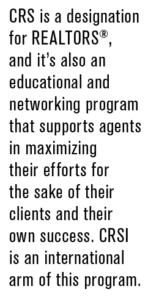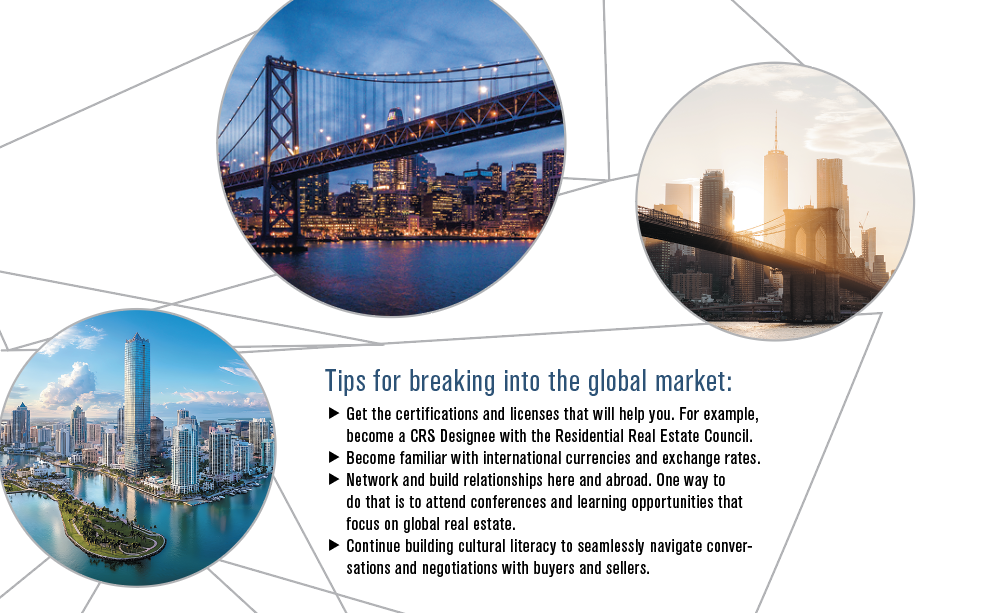By Vanessa Park
Ours is a global world. Families vacation abroad. Young people go to college in countries other than their own. Investors don’t limit themselves to their own backyards. These are just some of the incentives people have for purchasing real estate internationally.
In the United States, most international real estate transactions take place in the cities with the highest volume of overseas trade and a highly globalized citizenry and economy—cities like Miami, New York City, Los Angeles and Houston. But the market is opening up.
Sandra Fernandez, CRS, managing broker at LifeStyle International Realty in Miami, Florida, has some solid tips for breaking into international real estate or improving on your existing global business. Her enthusiasm for global real estate never fades, and she encourages others to tap into this exciting and growing market.
Any Agent Can Be International
Approximately 30% of Fernandez’s business is international, and her clientele includes second-home buyers and investors. Second-home buyers tend to stay near the global hubs, while investors are more likely to reach farther afield to find affordable properties. Their primary goal is to maximize their return on investment (ROI), wherever that may take them.
Fernandez got involved with international real estate because her city, Miami, is a hub of global commerce. “I realized,” she says, “that if I did not take steps to educate myself and get the credentials, I’d miss out.”
Fernandez has a message for real estate professionals looking to break into the international market. “Don’t assume your region is not a good candidate for global property transactions. Whether you are an agent in Flint, Michigan, or Pittsburgh, Pennsylvania,” she says, “Foreign investors want to talk to you.”
What are foreign investors looking for? They consider a property’s net operating income (NOI)—the difference between operating expenses and the total income—essentially a property’s profitability, a critical metric for calculating potential ROI over time.
Cultural Literacy and Logistics
As a highly experienced residential real estate professional, Fernandez emphasizes doing your homework to learn the customs and norms of your client’s home country. Cultural literacy goes a long way toward reassuring a client that you understand where they are coming from. This includes adjusting for their time zones and facilitating communication with clients who may not speak English fluently. There are online real-time translation tools available to help meetings run smoothly. Doing legwork ahead shows your courteous professionalism.
Because the laws differ in each country, international buyers need a trusted attorney with experience in international real estate deals. Foreign buyers from any country will need representation in the city where they want to purchase.
Stand Out with Consistent Marketing
The most important logistical matter is finding an agent to refer to in the other country. Fernandez explains, “If I have a client who wants to buy or sell in Miraflores, Peru, I call a contact I have there or do some research. I find an agent who represents buyers and sellers in Miraflores and check their credentials.” Once they agree to the terms, Fernandez sends them a referral compensation agreement that includes her fee. Once it’s signed and executed, the overseas agent handles everything from there.
No matter where you live, Miami, New York or Boise, you must market to capture those international purchasers. Fernandez focuses all her marketing efforts on LinkedIn, Facebook and Instagram. The algorithms are your friend—use keywords and hashtags likely to draw global real estate investors. On LinkedIn, spend time connecting with agents overseas as well as potential investors.
As the world grows increasingly interconnected, the potential for international real estate is only accelerating. Forward-thinking agents who embrace cultural literacy, cultivate overseas relationships and invest in strategic marketing can position themselves to thrive in this dynamic marketplace. For Fernandez, global real estate isn’t just a niche—it’s the future. And with the right mindset and tools, any agent, anywhere, can become a trusted player on the international stage.









